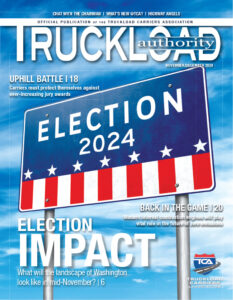As 2022 wound down, things seemed to be winding up at the Federal Motor Carrier Safety Administration (FMCSA). First, the agency announced it is set to roll out the final rule on the often-controversial speed limiter rule. Second, a request for public comments on the FMCSA’s proposal to require electronic logging devices (ELDs) on pre-2000 tractors drew both ire and support. Next, the agency set interim guidelines aimed at defining the differences among brokers, bona fide agents, and dispatch services as required in the 2021 Bipartisan Infrastructure Law. Finally, the FMCSA says it has pledged to get better at removing dangerous carriers from service.
FMCSA set to roll out final speed limiter proposal
The FMCSA is planning to unveil its final proposal regarding commercial motor vehicle speed limiters this year. The agency wrote in the U.S. Department of Transportation’s (USDOT) September rulemaking report that June 2023 is the target date.
In May 2022, the FMCSA sought comments on the proposal, which will affect vehicles with a gross weight of 26,001 pounds or more, which would be equipped with an electronic control unit that’s capable of being governed. A governed speed has not yet been determined, according to the FMCSA.
The move is a follow-up to a 2016 joint proposal between the FMCSA and the National Highway Traffic Safety Administration for CMV speed limiters that didn’t gain traction.
The newest proposal garnered about 15,000 comments in its initial reveal on the Federal Register as part of a supplemental notice of proposed rulemaking.
Many comments pointed to the possibility of slower-moving trucks actually impeding traffic and creating hazards.
A representative of Beyond Dirt LLC wrote on the comment page: “… all it will do is impede traffic in places where the … speed limit is higher, making driving a truck more dangerous for the truck driver because the cars around it will be making aggressive maneuvers to get around it.”
Karl Wendtand wrote: “This is a stupid idea, the danger of more accidents from cars hitting trucks will go up more if you do this. … Punishing me and other professional drivers for actions by car drivers is not only unfair and discriminating to those of us that do the hard work of delivering everything you buy. If you really want to lose the older and safer drivers then pass this regulation. The driver shortage will increase by over 50% and you will destroy this industry.”
The Owner-Operator Independent Drivers Association (OOIDA) also opposes the proposal.
The OOIDA Foundation points to research that states the frequency of interactions with other vehicles increases 227% when traveling 10 mph below the speed of traffic.
“Considering that the United States has highways with speed limits posted at 80 mph or more, a truck that is speed limited at 60 mph may have to travel 20-25 mph slower than the flow of traffic,” according to an article on Land Line, the news magazine for OOIDA.
A study by University of Arkansas researchers in 2006 found that speed limit differentials compromise highway safety.
OOIDA also points out that regulating a truck’s top speed does not stop it from speeding.
“Although a speed limiter mandate set at 60 mph would force trucks to drive well below the posted speed limit on most highways, it would not prevent them speeding through city traffic, construction zones or in inclement weather,” OOIDA officials stated.
The OOIDA Foundation says “research shows that forcing truckers to lose time during high-speed zones can encourage them to driver faster than they should through slower zones so that they can make their deliveries on time.”
There is some support for the proposal, however.
Chris Spear, president of the American Trucking Associations (ATA), said his organization approves of speed limiters.
“ATA is pleased that the Federal Motor Carrier Safety Administration is pursuing a constructive, data-driven approach to the issue of truck speed limiters in its latest proposal,” Spear said. “We intend to thoroughly review FMCSA’s proposal, and we look forward to working with the agency to shape a final rule that is consistent with our policy supporting the use of speed limiters in conjunction with numerous other safety technologies.”
There are some companies that have been using speed limiters on their rigs for years. Walmart, for example, sets the top speed of its rigs at 65 mph.
The Truckload Carriers Association also supports the proposal, saying it views the decision to mandate speed limiters “as a sensible next step in the ongoing effort to reduce accidents on our roadways and improve safety in the industry.” The association supports “a policy with a maximum speed of 65 miles per hour, or 70 miles per hour if there is adaptive cruise control or automatic emergency braking. In addition, carriers should be allowed to utilize measured flexibility to ensure drivers can safely react to speed differentials.”
ELD requirement could be extended to pre-2000 tractors
The comment period on the FMCSA proposal to require trucks with pre-2000 engines to comply with the electronic logging device (ELD) mandate ended on November 15 with a variety of opinions.
Among them was the Truckload Carriers Association, which wrote that ELDs “should be required on as many trucks as possible, including rebuilt or remanufactured engines or glider kits that can accommodate ELD technology. FMCSA should push for expanded ELD adoption, because it is an important tool to track compliance for the hours-of-service regulations, which were designed to improve safety.”
On the other side, the Commercial Vehicle Safety Alliance (CVSA) wrote against the measure.
“CVSA was and continues to be a strong supporter of the ELD requirement,” according to CVSA’s comment. “While expanding the ELD requirement to include these types of vehicles would bring more vehicles under the ELD requirement and help improve hours-of-service compliance and roadway safety for those vehicles, this change would be difficult to enforce, eroding any intended safety benefit.
“It is very difficult to verify roadside whether or not a vehicle is subject to the ELD regulations based on the engine manufacture date. Expanding the ELD requirements to include these vehicles will result in confusion and inconsistencies in enforcement of the regulations.”
The Owner-Operator Independent Drivers Association (OOIDA) also opposes the proposed measure.
“The agency lacks data confirming the ELD mandate has improved highway safety and has failed to demonstrate how the expansion of existing requirements to vehicles operating on pre-2000 and rebuilt pre-2000 engines would enhance safety,” the association wrote. “OOIDA is unaware of any research that demonstrates vehicles operating under the pre-2000 exemption fail to meet the same level of safety as vehicles with ELDs.”
Many professional truck drivers are also against the proposal.
The FMCSA’s advance notice of proposed rulemaking considers changes to the ELD mandate in five areas:
- Applicability to pre-2000 engines;
- Addressing ELD malfunctions;
- The process for removing an ELD from FMCSA’s list of certified devices;
- Technical specifications; and
- ELD certification.
In 2012, Congress acted to require the use of ELDs by law. As a part of a highway funding bill, MAP-21 (Moving Ahead for Progress in the 21st Century), the FMCSA was required by law to mandate ELDs. After conducting a number of studies, the rule was published in December 2015. December 18, 2017, was the deadline for most carriers to implement ELDs.
Interim guidance governs brokers, dispatchers
The FMCSA is working to stop companies that engage in truck brokering without proper authority. FMCSA officials on November 15 released interim guidelines that are aimed at defining the differences between brokers, bona fide agents and dispatch services. The new guidance was required as part of the 2021 Bipartisan Infrastructure Bill.
Dispatchers need broker authority if they:
- Interact or negotiate a shipment of freight directly with the shipper or a representative of the shipper.
- Accept or take compensation for a load from the broker or factoring company or are involved in any part of the monetary transaction between any of those entities.
- Arrange for a shipment of freight for a motor carrier, with which there is no written legal contract with the motor carrier that meets the aforementioned criteria.
- Accept a shipment without a truck/carrier then attempt to find a truck/carrier to move the shipment.
- Are a named party on the shipping contract.
- Are soliciting the open market of carriers for the purposes of transporting a freight shipment.
Dispatchers operating as unauthorized brokers can face a fine of up to $10,000 for each violation.
Related to bona fide agents, FMCSA officials stated that representing more than one motor carrier does not necessarily mean one is a broker rather than a bona fide agent.
“Motor carriers, or persons who are employees or bona fide agents of carriers, are not brokers within the meaning of this section when they arrange or offer to arrange the transportation of shipments which they are authorized to transport and which they have accepted and legally bound themselves to transport,” according to the FMCSA.
“In that same section, bona fide agents are defined as persons who are part of the normal organization of a motor carrier and perform duties under the carrier’s directions pursuant to a preexisting agreement which provides for a continuing relationship, precluding the exercise of discretion on the part of the agent in allocating traffic between the carrier and others.”
FMCSA officials said they do not believe it is the intent of Congress to eliminate the services that dispatchers provide.
“It is clear based on feedback from industry that there is a need and desire for dispatch services, among large and small motor carriers,” according to FMCSA officials. “A beneficial role that a dispatch service may provide is the outsourcing of resources for small motor carriers who cannot afford a full-time employee to perform these functions. The dispatch service can help to ensure the motor carrier has a steady stream of shipments while allowing the motor carrier to focus on its core business of safely transporting freight.”
In response, John Elliott, Chairman of the Truckload Carriers Association, said “Unfortunately, the guidance issued by FMCSA does not provide firm enough definitions to result in meaningful disruption of improper practices. The legal descriptions of these roles are ambiguous at best. Carriers need to be able to know who is operating legitimately and who to avoid.”
FMCSA rethinking carrier rating structure
Officials at the FMCSA say they want to be more effective at getting miscreant motor carriers off of America’s highways.
“FMCSA is seeking information on how the agency might use data and resources more effectively to identify unfit motor carriers and to remove them from the nation’s roadways,” according to a statement published in the U.S. Department of Transportation’s Significant Rulemaking Report in late 2022. “FMCSA would seek public comment about the use of available safety data, including inspection data, in determining carrier fitness to operate.”
The FMCSA plans to publish an advance notice of proposed rulemaking on the issue in January, and a notice on safety fitness procedures is expected January 30, 2023. The public will have a chance to make comments once the rulemaking draft is published on the Federal Register. FMCSA officials also want public input on possible changes to the current three-tier safety fitness rating structure of satisfactory, conditional and unsatisfactory.
The Federal Motor Carrier Safety Regulations that FMCSA uses in its safety fitness rating methodology are also expected to receive a thorough review. The FMCSA may place an interstate commercial motor carrier out of service for the following reasons:
Imminent hazard: Whenever it is determined that a violation of 49 USC 31502 or the Motor Carrier Safety Act of 1984, as amended, or the Commercial Motor Vehicle Safety Act of 1986, as amended, or a regulation issued under such section or acts, or a combination of such violations, poses an imminent hazard to safety.
Failure to pay civil penalty: Whenever a CMV owner or operator fails to pay a civil penalty in full within 90 days of the date specified for payment by the FMCSA final agency order.
“Unsatisfactory” rated motor carriers: Generally, a motor carrier that is rated “unsatisfactory” is prohibited from operating a CMV.
Since December 2021, the FMCSA has declared eight carriers to be imminent hazards to public safety.
Trucking industry image ‘stronger than ever,’ poll says
Most Americans believe the trucking industry plays a vital role in the nation’s economy and have a “favorable impression” of trucking, according to a national poll conducted by Trucking Moves America Forward (TMAF). The organization released the results of its latest survey.
“Our latest polling shows that the image of the trucking industry is stronger than ever,” said Kevin Burch, co-chairman of TMAF and vice president of government affairs and sales for Martin Transportation Systems.
“The public perception of the trucking (industry) is at an all-time high, with our poll finding that the majority of Americans — 87% of voters — have a favorable impression of trucking, which is the highest public opinion has been since TMAF began tracking industry views in 2014,” he said.
The national poll, conducted September 7-14 by Public Opinion Strategies on behalf of TMAF, surveyed 1,000 registered voters. Some key findings of the survey, along with comparisons to the 2019 poll, include the following:
- 87% of voters have a favorable impression of the trucking industry (up from 67% in the 2019 poll).
- 97% of Americans believe the trucking industry plays a “very important” role in the country’s economy (unchanged from 2019).
- Nearly three-fourths — 72% — of respondents rate the industry’s safety record as “excellent” or “good” (up slightly from 70% in 2019).
- When asked about truck drivers, 96% of Americans stated they are essential to keeping the country’s economy moving; 85% consider truck drivers to be professionals; and 78% believe truck drivers have higher standards for safety than other drivers.
Voters have generally heard people say more positive than negative things about the trucking industry, with comments like “keeping stores stocked,” “critical for the success of the country” and “keeping the country moving” as top responses.
When voters were asked which group of workers should be considered “essential or critical” to the country in times of crisis, trucking ranked among the top three, along with grocery store workers and health care workers.
“More and more Americans continue to realize the essential role that trucking plays in the nation’s economy and in all of our lives, thanks to industry-wide education efforts. TMAF will continue our mission to tell the positive story of trucking to shift public perception even higher,” Burch said.
Gloria Shepherd named new executive director at FHWA
Gloria Shepherd will be the 11th executive director of the Federal Highway Administration (FHWA), according to an announcement by the U.S. Department of Transportation (DOT). Shepherd will be the first woman, and the first African American, to lead the agency.
“It does not fall short on me the enormous responsibility that comes with the position,” Shepherd said. “I am grateful that history has allowed me to fulfill the dreams of my parents and relatives who have gone on and bent their shoulders low, so I could stand on them in this position of public service. I am confident with the help of all the talented people in FHWA, we will not only fulfill our mission but reach new horizons.”
Shepherd has more than 23 years of experience with the agency. FHWA officials say she has “produced a track record of success and a proven ability to produce results, develop effective national partnerships and coalitions, and open doors through her mentorship for future leaders within DOT.”
“From her work at the Maryland and New York departments of transportation, to more than two decades at FHWA, Gloria has dedicated her extraordinary career to serving the traveling public,” said U.S. Transportation Secretary Pete Buttigieg. “We are lucky to have her expertise, insight, and dedication as we work to modernize our nation’s roads, bridges, and highways to serve the American people now and for generations to come.”
Since 2007, Shepherd has served as the associate administrator for planning, environment and realty at FHWA.
Before becoming an associate administrator, Shepherd served for eight years as the director of office of planning, where she was the principal advocate for metropolitan and statewide planning and programs. Before joining FHWA, she served in executive level positions with the Maryland State Highway Administration and the New York Department of Transportation.
“Our nation’s street and highway infrastructure is changing in real time and there is no one with more experience and dedication to this work to help guide that transition than Gloria,” said FHWA Acting Administrator Stephanie Pollack.
This article originally appeared in the January/February 2023 edition of Truckload Authority, the official publication of the Truckload Carriers Association.
The Truckload Authority News Staff, comprised of award winning journalists and graphic artists, produces content for Truckload Authority, working in cooperation with the Truckload Carriers Association staff. Truckload Authority aims to keep TCA members abreast on the latest trends in the trucking industry as well as articles that feature TCA member executives and drivers. The Truckload Authority staff is based in Little Rock, Arkansas.







